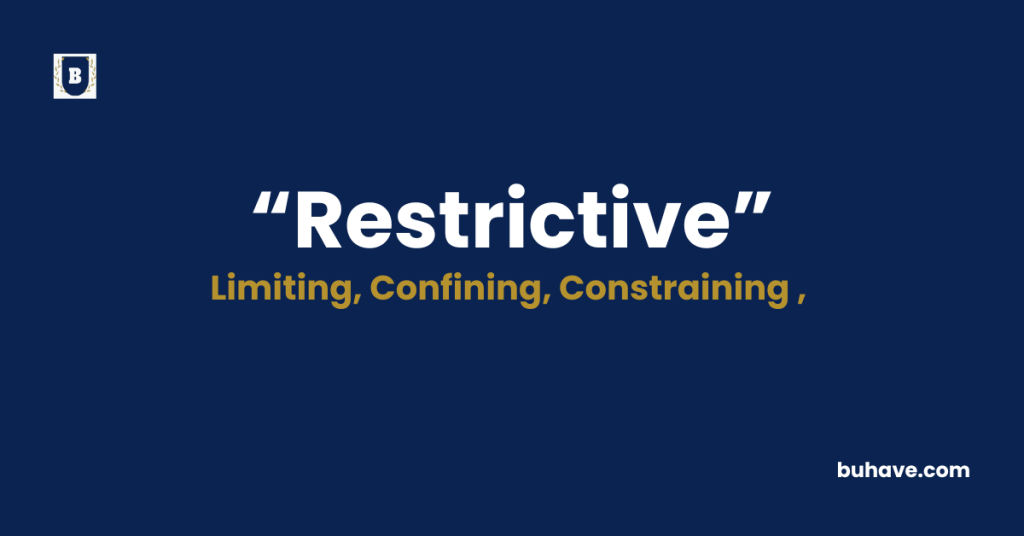The word Restrictive (Adjective) refers to something that limits freedom, movement, or growth. In this guide, you’ll learn the full definition, synonyms, antonyms, etymology, and real-life examples of how to use Restrictive correctly in sentences.
Restrictive Explained in Depth
A complete and detailed guide to the word Restrictive including meaning, definition, examples, etymology, synonyms, and antonyms.
Meanings of Restrictive
Restrictive means limiting or controlling what someone can do, access, or express. It often describes rules, laws, systems, or situations that reduce flexibility or freedom.
Definition
Restrictive refers to something that imposes limits, boundaries, or constraints on a person, group, action, or condition. These restrictions may be formal, such as laws or regulations, or informal, such as social norms or expectations. Restrictive measures are often put in place to maintain order, ensure safety, or control behavior. In grammar, a restrictive clause limits or specifies the meaning of the noun it modifies. In social and economic contexts, a restrictive environment can suppress creativity, innovation, or equal opportunity. While restrictions can offer protection or structure, they may also be perceived as burdensome, unfair, or outdated. Understanding the context helps determine whether something restrictive serves a positive or negative role.
Etymology
The word “restrictive” comes from the Latin verb restringere, meaning “to bind fast” or “to confine.” This word combines re- (back) and stringere (to tighten or draw). It passed into Old French as restricter and then Middle English as restrict. The adjective form “restrictive” first appeared in English in the late 16th century. Initially used in legal and religious contexts, the word emphasized moral or behavioral boundaries. Over time, its usage broadened to describe any rule, system, or condition that limits action or choice. Today, “restrictive” is used in grammar, medicine, law, fashion, and sociology—reflecting the concept of holding something back or narrowing possibilities.
Example Sentences
- The new policy is too restrictive for creative thinking.
- He found the dress code unnecessarily restrictive.
- Restrictive zoning laws prevented new businesses from opening.
Restrictive Synonyms
- Limiting
- Confining
- Controlling
- Constraining
- Binding
- Narrowing
- Prohibitive
- Suppressive
- Strict
- Inhibitive
Restrictive Antonyms
- Liberal
- Open
- Free
- Permissive
- Flexible
- Unrestricted
- Expansive
- Lenient
- Inclusive
- Tolerant
FAQs about Restrictive
Here’s a FAQ-style guide about the word “Restrictive”
1. What does restrictive mean in grammar?
A restrictive clause provides essential information about the noun and cannot be removed without changing the sentence’s meaning.
2. Is being restrictive always bad?
No. Sometimes, restrictions are necessary for safety, order, or focus.
3. What’s the difference between restrictive and limiting?
They are often used interchangeably, but “restrictive” usually implies a formal or enforced limitation.
4. Can clothes be restrictive?
Yes. Clothing that is tight or uncomfortable may be described as restrictive.
5. How does a restrictive environment affect people?
It may suppress creativity, reduce motivation, or cause frustration, depending on the context and individual.

















